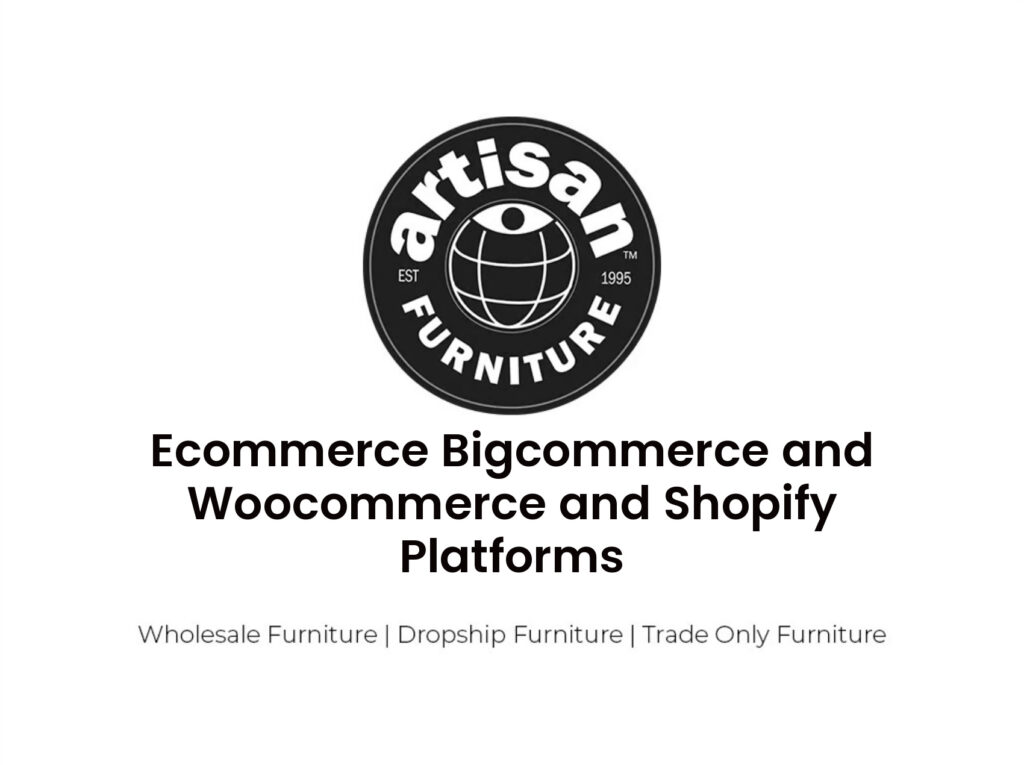Ecommerce Bigcommerce and Woocommerce and Shopify Platforms
Did you know that Shopify offers over 6,000 apps in its Shopify App Store, while BigCommerce and WooCommerce have a more limited selection?
In the competitive world of ecommerce, entrepreneurs are constantly seeking platforms that offer app availability, customization options, and seamless integration with payment gateways.
In this article, we will delve into the features and functionalities of these three prominent platforms – BigCommerce, WooCommerce, and Shopify – helping you make informed decisions for your online business.
Table of Contents
ToggleApp Availability and Customization
When it comes to app availability and customization, entrepreneurs have a range of options to choose from in both the BigCommerce and WooCommerce platforms. Both platforms offer a variety of apps that can enhance the functionality and customization of an ecommerce store. However, it is important to note that BigCommerce and WooCommerce have a smaller selection of apps compared to Shopify, which boasts over 6,000 apps in the Shopify App Store.
The apps available on Shopify provide entrepreneurs with a wide range of options for customization, business promotion, and product sourcing. These apps offer features that can be tailored to suit various business needs, providing flexibility and versatility. This extensive selection of apps on Shopify allows merchants to find the perfect solutions to optimize their online stores.
While BigCommerce and WooCommerce have a more limited app selection, they still offer a decent range of options for entrepreneurs. These platforms provide essential features and functionalities that are necessary for running an ecommerce business. However, if app availability and customization are top priorities for entrepreneurs, Shopify may be the better choice due to its vast selection of apps and the ability to customize and enhance the online store to a greater extent.
Payment Gateways and Global Selling
Shopify provides more payment gateway options than BigCommerce and WooCommerce, allowing sellers to cater to a global audience. This is particularly advantageous for businesses engaged in dropshipping or working with wholesalers, as they can offer a variety of payment options to their customers.
Many countries have their own popular payment gateways available on Shopify, which means that sellers can use the same payment providers as their global customers. With more payment gateway options on Shopify, sellers have the flexibility to choose the ones that work best for their target markets.
Global selling is made easier on Shopify due to its diverse selection of payment gateways. This allows sellers to expand their customer base and enter new markets with ease. By offering multiple payment options that are popular and trusted in different countries, sellers can build trust and credibility with their international customers.
Offline Selling and Inventory Management
During offline selling, businesses using platforms like BigCommerce and WooCommerce have the capability to manage their inventory effectively. Both platforms offer features that enable offline selling through a point-of-sale system. Shopify, on the other hand, goes a step further by providing a unified platform for both online and offline sales. This can be particularly beneficial for businesses with brick-and-mortar stores looking to expand their online presence.
One key aspect of inventory management during offline selling is the ability to track stock levels accurately. Both WooCommerce and Shopify offer advanced inventory features that allow businesses to keep track of their stock in real-time. This ensures that businesses can avoid overselling or running out of stock, which can result in dissatisfied customers.
Another feature that is important for offline selling is the ability to delegate responsibilities to staff members. Shopify offers custom staff permissions, allowing businesses to assign specific tasks and responsibilities to different team members. This can be particularly useful for businesses with multiple employees, as it streamlines the inventory management process and reduces the risk of errors.
In addition to managing inventory during offline selling, both platforms also support dropshipping. This means that businesses can easily connect with suppliers and have products shipped directly to customers, without the need for storing inventory themselves. This can be a cost-effective solution for businesses looking to expand their product offerings without the need for additional storage space.
Bandwidth and Storage
When it comes to bandwidth and storage, Shopify and BigCommerce both offer unlimited bandwidth, ensuring that websites can handle high volumes of traffic.
However, WooCommerce does not manage bandwidth or file storage, which may limit its scalability for businesses with growing needs.
Additionally, Shopify allows users to add unlimited files, images, and data, providing ample storage capacity for hosting websites.
These considerations make Shopify and BigCommerce viable options for businesses looking for sufficient bandwidth and storage capabilities.
Unlimited Bandwidth Vs. Storage
While Shopify offers unlimited bandwidth, WooCommerce does not manage bandwidth or file storage. This means that Shopify users have the advantage of unlimited bandwidth, allowing their websites to handle high volumes of traffic without any issues. Shopify also provides ample storage capacity for hosting websites, allowing users to add unlimited files, images, and other data. This ensures that Shopify users have enough storage space to store all their website content.
On the other hand, WooCommerce users will need to manage their own bandwidth and storage requirements. They will need to find their own storage solutions to accommodate their website content.
File Storage Limitations
Since WooCommerce does not manage bandwidth or file storage, users will need to find their own storage solutions. This means that if you are using WooCommerce as your ecommerce platform, you will need to find a separate storage solution for your files, images, and other data.
This can be a challenge for users who are not familiar with file storage options, but there are many solutions available that can meet your needs. Some popular options for file storage include cloud storage services like Dropbox or Google Drive, or dedicated file hosting services like Amazon S3.
These solutions can provide ample storage capacity for hosting your website and managing your files. It is important to consider your specific needs and requirements when choosing a file storage solution for your WooCommerce dropshipping business.
Hosting Capacity Considerations
Shopify offers unlimited bandwidth and ample storage capacity for hosting websites, making it a reliable choice for businesses with high hosting capacity requirements.
This is particularly beneficial for businesses that engage in dropshipping or work with wholesalers, as they often need to handle large amounts of data and images.
With Shopify’s unlimited bandwidth, businesses can ensure smooth and uninterrupted website performance, even during peak traffic periods.
Additionally, Shopify allows businesses to add unlimited files, images, and other data, providing them with the flexibility to store and showcase their products effectively.
Support and Security
Both BigCommerce and WooCommerce provide reliable support and robust security features for their ecommerce platforms. When it comes to support, both platforms offer a range of resources to assist merchants. Shopify, in particular, stands out with its 24/7 support availability, regardless of the plan. Merchants can access help docs, webinars, blog posts, and online courses to gain guidance and enhance their understanding of the platform. Additionally, Shopify has built an extensive ecosystem of experts and partners who can provide personalized assistance to merchants, ensuring that they have the support they need to succeed.
In terms of security, Shopify prioritizes the protection of its merchants and their customers. The platform provides SSL certificates, ensuring secure connections and protecting sensitive data. It is also PCI compliant, meaning it meets the industry standards for handling payment information securely. Shopify goes further by offering fraud protection measures to detect and prevent fraudulent activities. These security features provide peace of mind to merchants, knowing that their ecommerce platforms are equipped with the necessary safeguards to protect their business and customers.
Dropshipping Capabilities
Offering seamless integration with third-party suppliers and automating order fulfillment, BigCommerce, WooCommerce, and Shopify provide dropshipping capabilities to streamline the process of selling products online.
Dropshipping is a popular method in ecommerce where the retailer does not hold inventory. Instead, when a customer places an order, the retailer purchases the item from a third-party supplier who then ships it directly to the customer. This eliminates the need for the retailer to handle and store inventory, making it a cost-effective and efficient way to run an online business.
All three platforms, BigCommerce, WooCommerce, and Shopify, have built-in features and integrations that enable easy dropshipping. They allow users to connect with various suppliers and automatically forward orders to them for fulfillment. This means that once the retailer receives an order, the platform takes care of the entire process, from sending the order details to the supplier to tracking the shipment. This automation saves time and effort, allowing retailers to focus on other aspects of their business.
In addition to the dropshipping capabilities, these platforms also offer features like inventory management, order tracking, and customer support to ensure a smooth and hassle-free experience for both the retailer and the customer.
With their user-friendly interfaces and extensive app marketplaces, BigCommerce, WooCommerce, and Shopify are excellent choices for anyone looking to start a dropshipping business in the ecommerce industry.
Wholesale Features
Wholesale features are an important consideration for businesses looking to offer wholesale pricing options and accommodate bulk orders.
This includes the ability to set different pricing tiers for wholesale customers, as well as providing a streamlined process for placing and managing bulk orders.
Additionally, wholesale features may include features such as minimum order quantities, custom pricing catalogs, and integration with inventory management systems to ensure efficient order fulfillment.
Wholesale Pricing Options
One advantage of using Shopify for ecommerce businesses is that it provides various wholesale pricing options to cater to different customer needs. This is particularly beneficial for businesses that engage in dropshipping or work with wholesaling suppliers.
Shopify allows merchants to set up wholesale pricing tiers, offering discounts based on quantity or customer type. With these wholesale pricing options, businesses can attract and retain wholesale customers, while also maintaining profitability.
The flexibility of Shopify’s platform allows businesses to easily manage and adjust their wholesale pricing strategies as needed. Whether it’s offering tiered pricing, volume discounts, or special pricing for specific customer groups, Shopify provides the tools and features to meet the diverse needs of wholesale businesses.
Bulk Order Capabilities
The inclusion of bulk order capabilities in ecommerce platforms such as BigCommerce, WooCommerce, and Shopify allows businesses to streamline their wholesale operations and efficiently manage large-scale orders. This feature is particularly beneficial for businesses that deal with products such as home furniture and home decor, where customers often prefer to place bulk orders.
By offering bulk order capabilities, these platforms enable businesses to easily process and fulfill large quantities of products, saving time and effort. Additionally, businesses can consider dropshipping options, where they can directly ship products from suppliers to customers, further optimizing their wholesale operations.
With the ability to handle bulk orders seamlessly, BigCommerce, WooCommerce, and Shopify provide a comprehensive solution for businesses in the wholesale industry.
SEO and Marketing Tools
SEO and marketing tools are essential for optimizing online visibility and driving targeted traffic to ecommerce websites. When it comes to these tools, all three platforms – BigCommerce, WooCommerce, and Shopify – offer a range of options to enhance the marketing efforts of online businesses.
BigCommerce provides built-in SEO features, such as customizable URLs, meta tags, and sitemaps, to help improve organic search rankings. It also integrates with popular marketing tools like Mailchimp and Google Analytics, allowing businesses to track and analyze their marketing campaigns effectively.
WooCommerce, as a WordPress plugin, benefits from the vast array of SEO plugins available in the WordPress ecosystem. These plugins offer features like XML sitemaps, keyword optimization, and social media integration, enabling businesses to optimize their website for search engines and attract more organic traffic.
Shopify also offers a range of SEO tools, including customizable meta tags, URL redirects, and the ability to edit robots.txt files. Additionally, Shopify integrates with popular marketing tools like Facebook Ads, Google Ads, and SEO Manager, allowing businesses to drive targeted traffic to their online stores.
Mobile-Friendly Website Design
With the increasing prevalence of mobile devices, ensuring a seamless and user-friendly experience on ecommerce platforms like BigCommerce, WooCommerce, and Shopify is crucial for businesses. Mobile-friendly website design is essential to meet the needs of customers who browse and shop online using their smartphones and tablets.
All three platforms, BigCommerce, WooCommerce, and Shopify, offer mobile-responsive themes and templates that automatically adjust the layout and functionality of the website according to the screen size of the device being used. This ensures that the website looks and functions optimally on any mobile device, providing a consistent and enjoyable experience for users.
Mobile-friendly design includes features such as easy navigation, clear product images, and simplified checkout processes, allowing customers to quickly find and purchase products with minimal effort. Additionally, these platforms provide options for integrating mobile payment gateways, making it convenient for users to complete transactions on their mobile devices.
Integration Options
Businesses can seamlessly integrate various third-party applications and services with BigCommerce, WooCommerce, and Shopify platforms to enhance their functionality and efficiency. These ecommerce platforms offer a wide range of integration options that allow businesses to customize their online stores according to their specific needs.
BigCommerce and WooCommerce have a smaller number of available apps compared to Shopify, with under 1,000 apps available for entrepreneurs. However, Shopify offers over 6,000 apps in the Shopify App Store, providing a diverse selection of options for various business needs. These apps allow for customization, business promotion, and product sourcing, giving businesses the flexibility to choose the right provider and features to meet their requirements.
In terms of payment gateways and global selling, Shopify provides more payment gateway options compared to BigCommerce and WooCommerce. Shopify allows sellers to use the same payment providers as their global customers, enabling selling to a global audience. Additionally, Shopify offers a wide range of payment gateways, including popular options specific to different countries.
Both WooCommerce and Shopify support offline selling through a point-of-sale system, allowing businesses to sell offline as well as online. Shopify provides a unified platform for online and offline sales, while WooCommerce and Shopify offer advanced inventory features to manage offline selling.
Lastly, Shopify offers unlimited bandwidth and ample storage capacity for hosting websites, similar to BigCommerce. On the other hand, WooCommerce does not manage bandwidth or file storage.
Pricing and Cost Analysis
For businesses considering the use of BigCommerce, WooCommerce, or Shopify platforms, a pricing and cost analysis is an essential step in determining the most suitable option. Each platform offers different pricing plans and features, so it’s important to understand the costs involved and how they align with your business needs.
BigCommerce offers three pricing plans: Standard, Plus, and Pro. The Standard plan starts at $29.95 per month, while the Plus and Pro plans are priced at $71.95 and $224.95 per month, respectively. With BigCommerce, there are no transaction fees, and all plans include unlimited products, file storage, and bandwidth.
WooCommerce, on the other hand, is a WordPress plugin that is free to download and install. However, there are additional costs to consider, such as hosting and domain fees. WooCommerce also offers a variety of paid extensions and themes that can enhance your online store’s functionality, ranging in price from $29 to $299.
Shopify has different pricing plans to cater to businesses of all sizes. The Basic Shopify plan starts at $29 per month, while the Shopify and Advanced Shopify plans are priced at $79 and $299 per month, respectively. In addition to the monthly fees, Shopify charges transaction fees ranging from 2% to 0.5% based on the chosen plan.
When conducting a pricing and cost analysis, it’s important to consider the features and benefits offered by each platform in relation to your business requirements. Additionally, factors such as ease of use, scalability, and customer support should also be taken into account to make an informed decision.
Frequently Asked Questions
How Does Bigcommerce Compare to Woocommerce and Shopify in Terms of Dropshipping Capabilities?
BigCommerce, WooCommerce, and Shopify all offer dropshipping capabilities, allowing entrepreneurs to easily manage inventory and fulfill orders. However, each platform has its own unique features and integrations that cater to different business needs.
Can Woocommerce and Shopify Support Wholesale Features for Businesses?
Yes, both WooCommerce and Shopify support wholesale features for businesses. They offer various tools and plugins that allow businesses to set up wholesale pricing, create bulk ordering options, and manage customer accounts for wholesale customers.
What SEO and Marketing Tools Are Available on Bigcommerce, Woocommerce, and Shopify?
There are various SEO and marketing tools available on BigCommerce, WooCommerce, and Shopify. These platforms offer features such as keyword optimization, meta tags, social media integration, email marketing, analytics, and more to help businesses improve their online visibility and marketing efforts.
How Does Each Platform Handle Mobile-Friendly Website Design?
Each platform handles mobile-friendly website design differently, offering various features and customization options. It is important to research and compare the capabilities of BigCommerce, WooCommerce, and Shopify to determine which platform best suits your business needs.
What Integration Options Are Available for Bigcommerce, Woocommerce, and Shopify?
Integration options for BigCommerce, WooCommerce, and Shopify include numerous apps and payment gateways for customization, global selling, offline selling, inventory management, and support. Each platform offers unique features to cater to various business needs.



